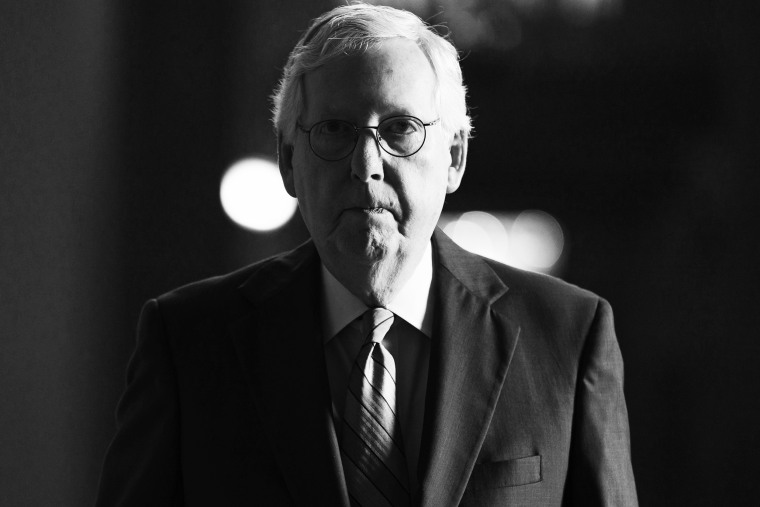WASHINGTON — Factions of senators are working to strike deals on issues from infrastructure and gun legislation to voting rights and police reform. But Senate Minority Leader Mitch McConnell is proving, again and again, that the road to making law goes through him.
McConnell, R-Ky., doesn't control the floor or command a majority. But he is seen as an effective tactician by his caucus, and that allows him to wield a powerful weapon: the filibuster rule.
A pattern is emerging for legislation the majority seeks to pass in the Democratic-controlled Senate: When McConnell supports it, it has a chance. When he opposes it, it tends to run headlong into the 60-vote barrier. In short, there is no easy route to pick off the necessary 10 Republicans without him.
That carries warnings for President Joe Biden's agenda, whether it's infrastructure or overhauling voting laws, as McConnell mobilizes to stymie his biggest ambitions.
Sen. Kevin Cramer, R-N.D., said that Republicans elected McConnell as caucus leader "because we trust his judgment" and that he sometimes asks senators to vote with him.
"He will occasionally say, 'For these reasons, I'm here, and I'm hoping that most of you could be with me.' So he'll reference that, but it's not that often," Cramer said. "And sometimes that's a political calculation and it leads to a political decision. He's nothing if not a master politician.
"He's not one to squander his influence," Cramer added. "He doesn't waste it on things that don't matter."
McConnell persuaded Republicans to block an independent commission to investigate the Jan. 6 attack on the U.S. Capitol — just six GOP senators voted for the proposal, which fell short of 60. McConnell also recently led a filibuster of the Paycheck Fairness Act.
"I don't necessarily like it, but when he decides to tell his caucus, 'Don't support a bipartisan January 6th commission,' they mostly fall in line. And that's unfortunate," said Sen. Tim Kaine, D-Va. "When he tells them, 'Stick with me,' they usually do."
McConnell has, however, supported less contentious bills — and they have succeeded. He voted for legislation to boost U.S. competitiveness with China, which passed 68-32. He voted for a bill to combat hate crimes against Asian Americans, which passed 94-1. He voted for a modest upgrade to water systems, which passed 89-2.
That formula is unlikely to be replicated for Biden's top priority, passing a multitrillion-dollar economic plan to invest in infrastructure and expand the safety net. Democrats have the option to overhaul spending and tax laws without GOP votes. But that filibuster-proof avenue isn't available for other priorities, like changing election rules or the immigration system, which are likely to require McConnell's stamp of approval.
And that has created deep tension within the Democratic Party about whether to preserve or abolish the 60-vote threshold.
On occasion, McConnell wields power to stop his own members. Sen. Chuck Grassley, R-Iowa, learned it the hard way in 2019 when, by his account, McConnell stymied his bipartisan bill to reduce drug prices by asking GOP colleagues not to support it, and the bill faded.
"Oh, yeah, I found that out on drug pricing," Grassley said Thursday.
Grassley said that after McConnell stepped in, "too many people in the Republican caucus saw my bill as interfering in the free market." They were wrong, he said.
Sen. John Cornyn, R-Texas, a former top vote counter for McConnell, said his stamp of approval is "pretty significant" when it comes to motivating 10 GOP "yes" votes.
"It can happen without leadership, too, but I think it's more likely to happen when leadership presents a plan," Cornyn said. "It does give them a level of comfort."
'We stay with him'
Sen. Richard Shelby, R-Ala., said Republicans listen to McConnell.
"We stay with him. He's a good leader. He's a good negotiator. He understands the program and the Senate as well as anybody I've ever known," Shelby said, adding that when Republicans stay on his side, McConnell tries to "protect" them from political blowback.
Unlike in previous eras, when both parties included broad ideological spectrums of lawmakers who made way for dealmaking, few members of either party are regularly willing to break ranks. That means the path to winning 10 Republican votes tends to go through McConnell.
"It's no secret he's never been interested in getting a background checks bill done. No secret he's never been interested in getting an infrastructure bill done," said Sen. Chris Murphy, D-Conn. "I don't foresee us bringing a bill to the floor that isn't opposed by some parts of the gun lobby, and if that's the case, then Sen. McConnell obviously could push against it."
Sen. Jeff Merkley, D-Ore., calls it the "McConnell veto." Progressive activists say it proves the need to eliminate the 60-vote hurdle, which Democrats don't have the 50 votes to do.
Eli Zupnick, a former Democratic leadership aide and spokesman for a coalition working to end the filibuster, said: "Sen. McConnell's highest priority is blocking President Biden's agenda, and the filibuster is the weapon he wields to do that, so why would Senate Democrats continue giving him veto power over promises they made to the voters who put them in power?"
McConnell, who is frequently called an "obstructionist" by Democrats, wears the label as a badge of honor, having dubbed himself the "grim reaper" of progressive legislation in 2019.
Centrist Sen. Joe Manchin, D-W.Va., said during the Jan. 6 commission debate that "Mitch McConnell makes it extremely difficult" to get things done on a bipartisan basis in the Senate. Still, he remains a supporter of the filibuster rule.
Ben Nelson, a former moderate Democratic senator from Nebraska, takes a dim view of McConnell in his coming book, "Death of the Senate," a copy of which was obtained by NBC News. He warns Biden not to trust McConnell, calling him a "dark knight who lives, breathes and eats to gain political advantage breakfast, lunch, dinner."

